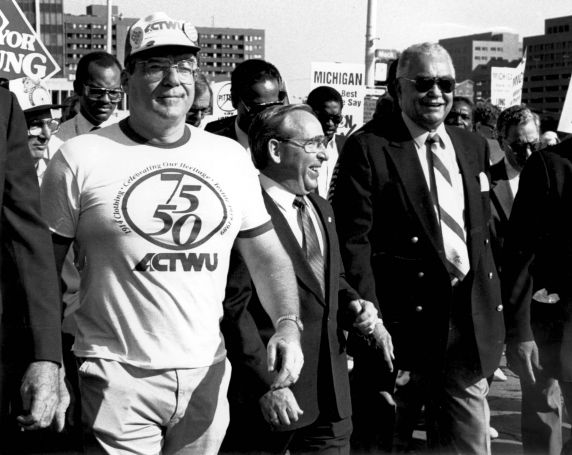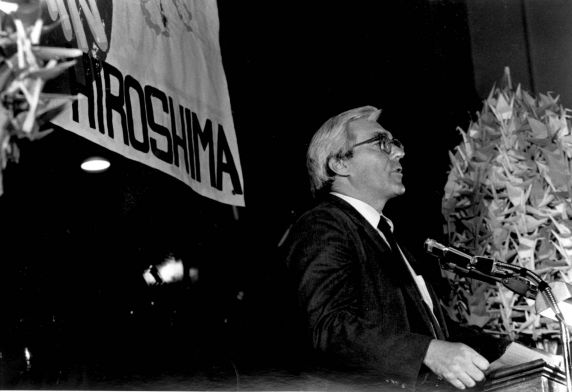Subject Focus: Bernie Firestone
Bernard “Bernie” J. Firestone was one of Detroit’s foremost social activists, a nationally recognized labor leader, and a champion of causes great and small. Influenced by everyday struggles, he was an advocate for anyone who faced oppression or injustice.
Firestone was born on October 25, 1935 in Detroit, Michigan and raised in the city. He learned the value of education and hard work from his father, Samuel, who was an electrical engineer for Detroit Edison, and his mother, Frieda, who was a teacher. After graduating from Thomas M. Cooley High School in 1953, he went on to earn Bachelor of Arts and law degrees from Wayne State University. In 1959, he was hired to replace future ACWA president Murray Finley as the union’s Detroit counsel. Firestone spent nearly forty years agitating, organizing, and pushing the labor movement forward with ACWA and its successor, the Amalgamated Clothing and Textile Workers Union (ACTWU).
Firestone believed a union should deliver more than wages or improved working conditions for its members. He saw the labor movement as a social movement, with the potential to enhance the lives of all working people. To this end, Firestone joined campaigns to raise funds for copper strikers, rally support for miners, and educate unionists in social causes in order to promote solidarity among workers. He was openly critical when principle was sacrificed for pragmatism, and carried a clear sense of purpose to multiple leadership positions within ACTWU and the Michigan State AFL-CIO.
In addition to labor-related activities, Firestone was on the front lines of promoting global peace, human rights, and equality. Whether fighting for healthcare legislation or gathering donations to feed the hungry, Firestone was a passionate human rights activist. He served on the boards of the Michigan Coalition for Human Rights, Michigan Council for the Humanities, United Community Services, and Urban Alliance, and was an active member of the American Civil Liberties Union, Coalition of Peaceful Integration, and NAACP. Greatly influenced by his parents, who were the first in their families to go to college, Firestone believed access to education should be equally available to all, regardless of race, age, or religion. He also directed his attention and efforts toward urban problems such as affordable housing, gainful employment, and safe neighborhoods through service to the Detroit Chapter of the A. Philip Randolph Institute, Detroit Board of Education, New Detroit, Inc., and the University District Community Association.
On September 6, 1989, Bernie Firestone’s life was tragically ended by a disgruntled ACTWU retiree, Stanislaw Siedlec. The former tailor was displeased with the terms of his retirement, and numerous attempts by ACTWU to reach an agreement were not successful. Siedlec was found guilty of first-degree murder.
Firestone touched many lives during his career as a labor leader and through his prolific activism. Bill Bonds, then anchor of WXYZ Action News, captured the very personal connection many people had to one of Detroit’s great humanitarians:
“Bernie Firestone was those rarest of men, a mind like a steel trap, the heart of a gladiator, the soul of a poet, he was a teacher, a friend, he saw no colors, he saw no religions, he saw no evil in his fellow man and woman. He saw pain and tears, suffering and he tried to help. He saw injustice and he tried to make the world more just. He was a fine American, fine husband, father, citizen, kind of a man you’d like your son to grow up to be, the kind of a man you’d like to see marry your daughter. A good, noble, caring human being, not easily replaced, impossible to forget.”
The Bernard Firestone Papers are housed at the Reuther Library.
Kristen Chinery is the Reference Archivist for the Walter P. Reuther Library.
- kchinery's blog
- Login to post comments
- Printer-friendly version



 Reddit
Reddit Facebook
Facebook LinkedIn
LinkedIn